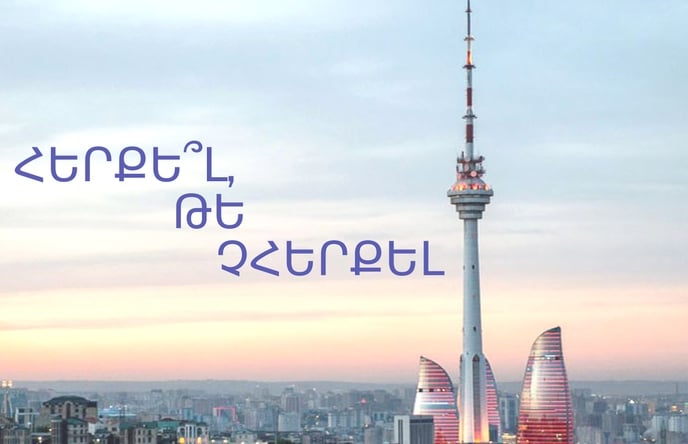
Picture the following situation: Azerbaijani websites spread information that the Armenian armed forces organized a diversion, attacked Azerbaijani positions and as a result had a victim. They distributed a photo of Armenian citizen, who allegedly organized the diversion and died.
Meanwhile, the person in the photo is well and alive and he is not even a soldier. The person turned to the media requesting to disprove the lies spread by the Azerbaijani website and to publish the truth.
Should the media write about this or not? By disproving the information published by the Azerbaijani website, doesn’t the media repeat the false propaganda, or do they need to disprove it anyway?
The following are comments from editors and media experts.
Tatul Hakobyan (Journalist, Civilnet.am, Expert on conflicts of the Caucasus): “If I am doing an analysis or a study on a war propaganda and false information, I would use this case as an example. You know, the truth is the first casualty of any war. If a citizen turns to me, and I see that the story is newsworthy, if it’s good and interesting, I’ll publish it. There are however many factors that affect your decision to address or not to address the issue.
I won’t look at it from the point of whether I am spreading Azerbaijani propaganda or not, if it’s a human story and if it’s a good story. Even if I indirectly contribute to it being spread, I will still publish it. Especially in today’s world, when information has no borders.
You do not decide whom you work for. In the age of the Internet, all that has disappeared. But again that’s a very personal decision.”
David Alaverdyan (Chief Editor, Mediamax): “Of course, we approach each case individually but the general principle is that Mediamax will neither publish the Azerbaijani news nor disprove it.
Sometimes we would do exceptions for cases when information is disproven by the Ministry of Defense of Armenia, as an official source.
By the way, that is exactly what Mediamax did and continued to do during recent scandalous cases when the Azerbaijani propaganda machine tried to use several Armenians in the anti-Armenian propaganda. We ignored these publications and didn’t disprove them.
Overall, we are very selective and cautious about our information sources and trust only those we know well and whose accuracy is tested with time.”
Samvel Martirosyan (Media Researcher): “In Armenia, we have two radical approaches, both wrong. One is publishing the Azerbaijani propaganda without disproving it, the other, not referring to the Azerbaijani media at all. I think the right thing to do is to disprove the false information. If you don’t disprove the false information, it becomes reality for a third party.”
Suren Deheryan (Media Exert): “If a media outlet or an online news platform spread an obvious lie or false information about a person, that can have dangerous consequences for that person or their family members, or even cause them moral harm, then the person has every right to use any means, including the laws of the country and International laws, to have the false information removed from the Internet.
In this case, since the information disseminated by the Azerbaijani media was probably in Russian and therefore available to a wider public, a citizen should try to publish the truth on the Internet through the media outlets that have an equal audience.
The media should investigate how the information on the person was obtained and used to create the news piece. I don’t rule out that version where the data was accessed simply through one of the social networks, where many publicly post personal details about themselves and their families, an action that one day can bring such unpleasant consequences.”
Lusine Barseghyan (Chief Editor, Haykakan Zhamanak newspaper, Armtimes.com): “The media should definitely write about it. First, let us not forget that the mission of any media is to provide accurate information to the public. I don’t see a problem with repeating the false information. On the contrary, we need to show that it’s false information and let the public know the reality.”
Gagik Aghbalyan
P.S. The story mentioned in the beginning of the article is real. In the first days of January, the Azerbaijani media presented one of Hrazdan residents as a diversionist. He turned to several media outlets, most of which didn’t address the story, as they were unwilling to risk repeating the Azerbaijani propaganda.


Add new comment
Comments by Media.am readers become public after moderation. We urge our readers not to leave anonymous comments. It’s always nice to know with whom one is speaking.
We do not publish comments that contain profanities, non-normative lexicon, personal attacks or threats. We do not publish comments that spread hate.